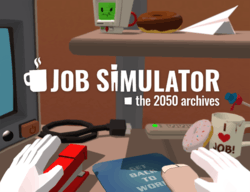Job Simulator
| Job Simulator: The 2050 Archives | |
|---|---|
 | |
| Developer(s) | Owlchemy Labs |
| Publisher(s) | Owlchemy Labs |
| Platform(s) | Microsoft Windows, PlayStation 4 |
| Release date(s) |
Microsoft Windows
PlayStation 4
|
| Genre(s) | Simulation |
| Mode(s) | Single-player |
Job Simulator: The 2050 Archives is a virtual reality simulation video game developed and published by Owlchemy Labs for Microsoft Windows, in which players participate in comical approximations of real-world jobs.
Gameplay
Players participate in simulated jobs in a job museum run by robots resembling floating CRT computer monitors with faces. The jobs are represented as tongue-in-cheek approximations of real occupations: "Auto Mechanic", "Gourmet Chef", "Store Clerk" and "Office Worker." Accompanied by a computer character who provides exposition and instructions, players perform tasks associated with that occupation, some realistic and others comical. For example, in the "Office Worker" simulation, players engage in activities like evaluating new employees and transferring calls, but are also called upon to eat doughnuts, share photos at the water cooler, and participate in other office tasks.
Using the motion controllers of the HTC Vive to represent their hands, players interact with the virtual environment similarly to how they would in real life. Most objects within the player's reach can be interacted with - many can be picked up and manipulated, while fixed objects such as keyboards and appliances will have buttons, levers, or dials that the player can utilize. After completing a certain amount of tasks, the player is offered to go back to the museum or continue interacting with the environment. Once the player completes all four job simulations, they're offered a variety of modifiers that change the physics of the gameplay.
The player is often afforded a large amount of creative freedom in how they complete a task. For example, when cooking pizza in the chef simulation, players can choose any ingredient they can reach, such as bacon, eggs, apples, or cookies to use as pizza toppings. When performing car repairs in the auto-mechanic simulation, players can choose what style of parts to use as replacements (for example, when replacing a flat tire, the player can choose from any of 9 available tire styles) and are allowed to perform repairs and replacements that aren't requested by the customer. The player is also free to mess around with the various objects in their reach, such as throwing things in trash cans or at robots, eating food lying around or taking the sunglasses off a customer.
Much of the game's humor comes from both stereotypical and exaggerated situations in the jobs performed: as a chef, the player is asked to bribe a food critic and navigate around the particular allergies of an underage customer having a birthday; as a car mechanic, the boss instructs the player to sabotage cars or strip a car for parts. Some of the game's humor comes from puns and other forms of word play: as an auto mechanic, one of the nine varieties of tires the player can give customers resembles a chocolate-covered doughnut with sprinkles as a play on the informal term "donut tires" often used to describe compact spare tires that are generally unsuitable for driving long distances; as a chef, the player is instructed to bake a cake for an underage customer's birthday party, and one of the ingredients is a flower,which sounds phonetically similar to "flour." The instructor also continually comments on the human nature of the jobs being at odds with the efficiency of robots, the obsolescence of humans in general, and at one point references an event called "the human uprising of 2027".
The game also features a special "spectator mode" that serves to provide a more entertaining perspective to the viewers who are observing someone playing the game: aside from the first person view, the player wearing the helmet can position cameras around themselves and switch between them, which then provide a viewport to the external screen of the VR setup; the player is then represented as a disembodied VR helmet and two gloves.[1]
Development

Job Simulator was the first game announced for the SteamVR device.[2] The game was also included with the HTC Vive at its launch on April 5, 2016.[1][3] The developers later lowered the game's price in response to customer reviews.[4] The developers created a "smaller human mode" for players who could not reach objects placed higher in the virtual reality environment.[5]
Reception
Polygon wrote that the game's spectator mode, in which the player can move a floating camera in the virtual space, was the perfect way to stream and spectate within virtual reality.[1] Kotaku wrote that Job Simulator was one of the few games that felt like complete experiences at the HTC Vive's launch.[6]
References
- 1 2 3 Ben Kuchera. "How Job Simulator created a perfect way to spectate, and stream, from within VR". Polygon.
- ↑ Phil Savage. "Job Simulator is the first SteamVR game to be announced". pcgamer.
- ↑ "The HTC Vive Review". Polygon. Archived from the original on April 10, 2016. Retrieved April 10, 2016.
- ↑ http://www.polygon.com/2016/4/20/11474088/job-simulator-price-drop-steam
- ↑ http://www.polygon.com/2016/5/4/11592826/behind-the-scenes-with-job-simulators-smaller-human-mode
- ↑ Nathan Grayson. "The Valve-Backed HTC Vive Is Virtual Reality At Its Best And Worst". Steamed. Gawker Media.
External links
![]() Media related to Job Simulator at Wikimedia Commons
Media related to Job Simulator at Wikimedia Commons